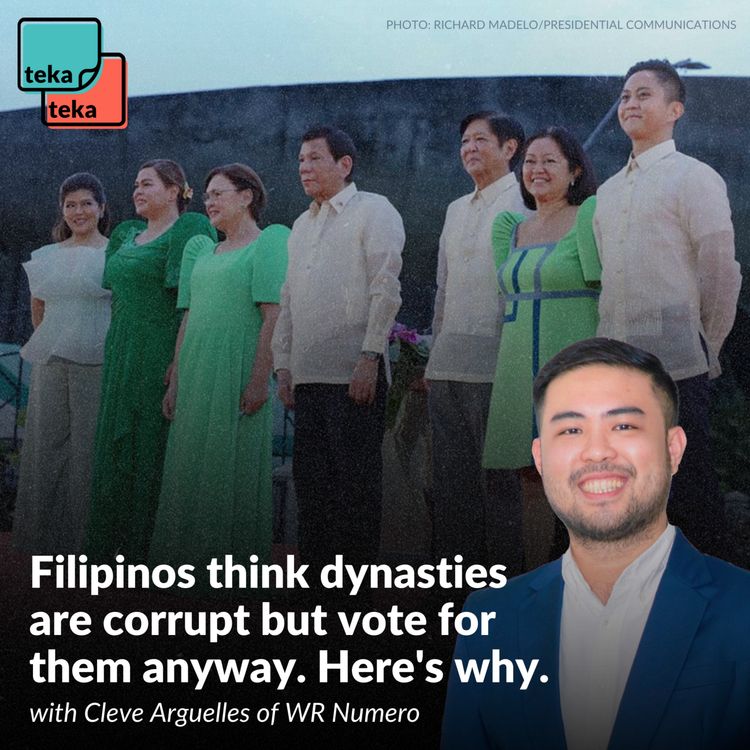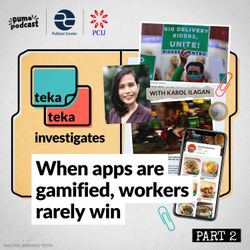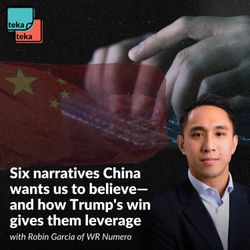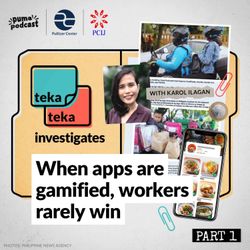Share

Teka Teka
Filipinos think dynasties are corrupt but vote for them anyway. Here's why.
•
Pollster and political scientist Cleve Arguelles and reporter Bella Perez-Rubio try to answer an age-old question: If Filipinos know dynasties are corrupt, why do they keep voting them back into power?
Listen to our previous episodes with Cleve Arguelles.
Most Filipinos want to be neutral on Palestine. Here’s why we shouldn’t be.
Six narratives China wants us to believe — and how Trump's win gives them leverage
For more from the PumaPodcast team, find us on these platforms:
More episodes
View all episodes

Fifteen years after the Maguindanao massacre, impunity lives on
08:32|Fifteen years ago, the Philippines was named the second-deadliest place in the world for journalists. That's because we did the unthinkable.For more from the PumaPodcast team, find us on these platforms:FacebookInstagramTwitterTiktok
How can I make a budget that works for 2025?
08:02|As 2024 begins to come to close, how can we create a feasible budget?For more from the PumaPodcast team, find us on these platforms:FacebookInstagramTwitterTiktok
When apps are gamified, workers rarely win (Part 2)
31:27|Got a food craving? Need groceries? Or maybe a ride? There's an app for that. In this special series for Teka Teka, we delve into the lives of food-delivery and ride-hailing workers in Metro Manila whose daily routine is dictated by an app. These gig-economy workers struggle with uncertain pay, indebtedness, the physical toll of chasing incentives, and the occasional challenging interactions with customers. Their stories reveal that in the Philippines, gig work is more than a side hustle – it's a full-time job. We meet: John Jay Chan, former rider, organizer for the National Union of Food Delivery RidersAtty. Evelyn Battad, professor at the College of Law, University of the Philippines DilimanDirector Alvin Curada, Bureau of Working Conditions, Department of Labor and Employment This episode was produced by Karol Ilagan with research by Jabes Florian Lazaro and Rosemarie Corpin. The episode was edited by Pidoy Blanco.Jil Caro is the executive producer. Carl Javier is the EIC of Teka Teka. This podcast was produced by PumaPodcast in partnership with the Pulitzer Center’s AI Accountability Network.Listen to the related episodes here
Sigurado ka ba na ‘healthier option’ ang kinakain mo?
11:49|As more young Filipinos are diagnosed with non-communicable diseases, public health advocates and legal experts are pushing for food warning labels to be placed at the front of packaging, to help consumers make more informed choices and reduce health risks.For more from the PumaPodcast team, find us on these platforms:FacebookInstagramTwitterTiktok
The growth of local beauty brands for Filipinas
33:18|After over a decade in the Philippine beauty industry, Albert Kurniawan throws his hat in the ring of beauty offerings with his beauty brand Teviant.For more from the PumaPodcast team, find us on these platforms:FacebookInstagramTwitterTiktok
Six narratives China wants us to believe — and how Trump's win gives them leverage
19:07|We all know that Chinese operatives are working overtime to run influence campaigns in the Philippines. But what narratives are they spreading and what do they actually hope to achieve? A research firm fills us in.For more from the PumaPodcast team, find us on these platforms:FacebookInstagramTwitterTiktok
The Uniteam's popularity takes a hit as the Marcos-Duterte feud gets dirty
15:00|Vice President Sara Duterte seems to be paying the price for her feud with President Bongbong Marcos in the court of public opinion, while the President is walking a very tightrope, says pollster and political scientist Cleve Arguelles.Listen to our previous episode to hear what Filipinos really think about the Marcos-Duterte rift and other topics hereFor more from the PumaPodcast team, find us on these platforms:FacebookInstagramTwitterTiktok
When apps are gamified, workers rarely win (Part 1)
34:48|Got a food craving? Need groceries? Or maybe a ride? There's an app for that. In this special series for Teka Teka, we delve into the lives of food-delivery and ride-hailing workers in Metro Manila whose daily routine is dictated by an app. These gig-economy workers struggle with uncertain pay, indebtedness, the physical toll of chasing incentives, and the occasional challenging interactions with customers. Their stories reveal that in the Philippines, gig work is more than a side hustle – it's a full-time job.